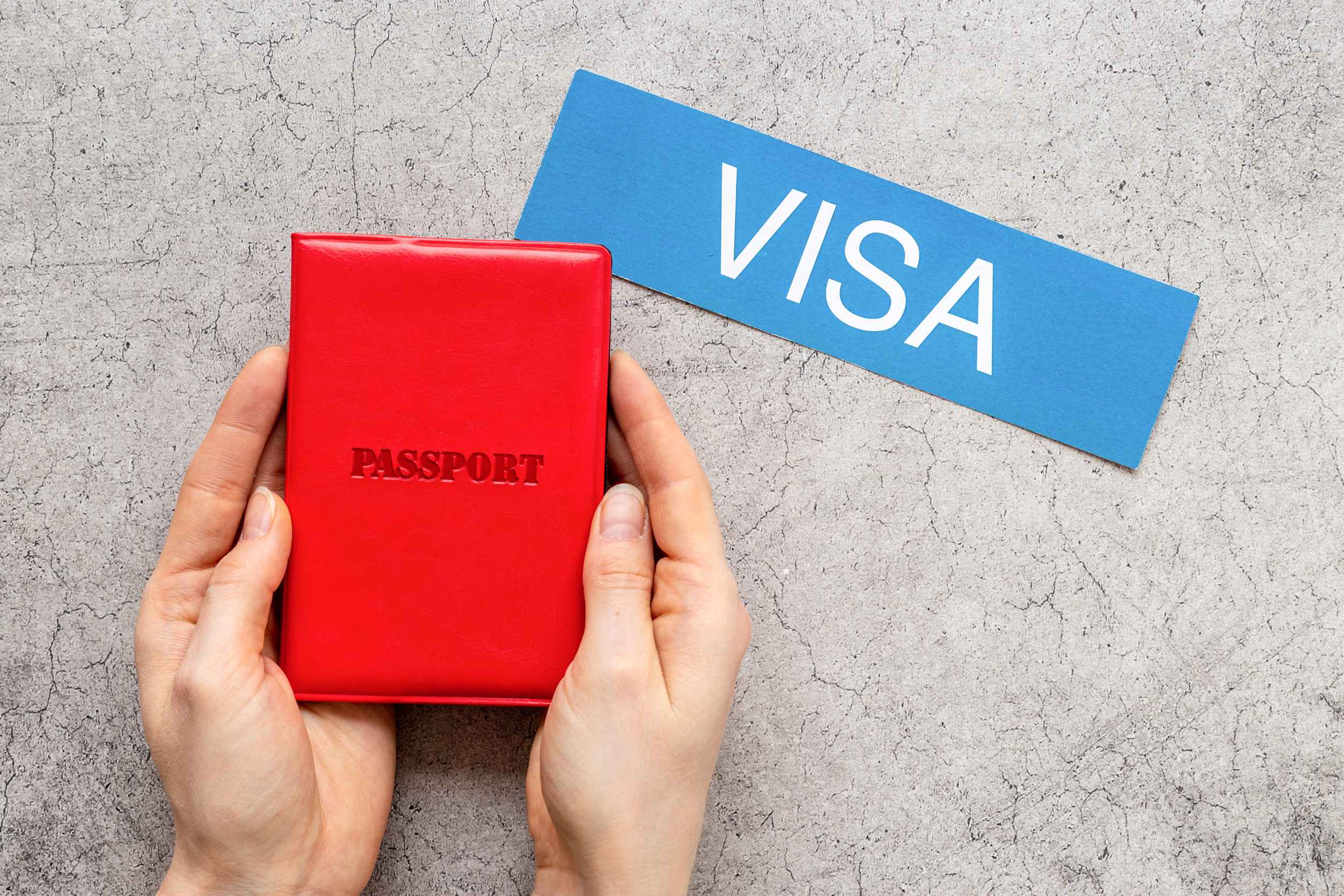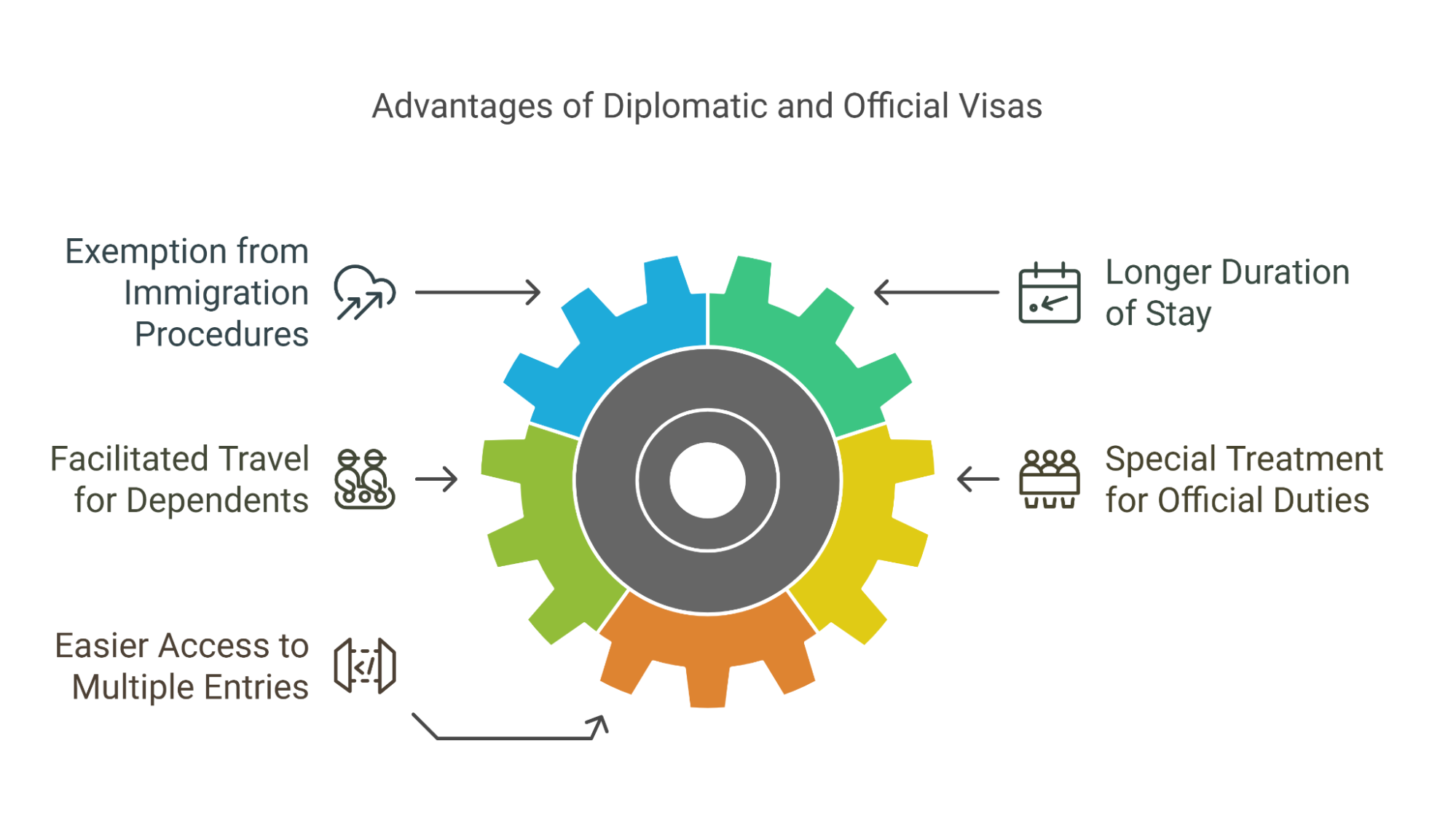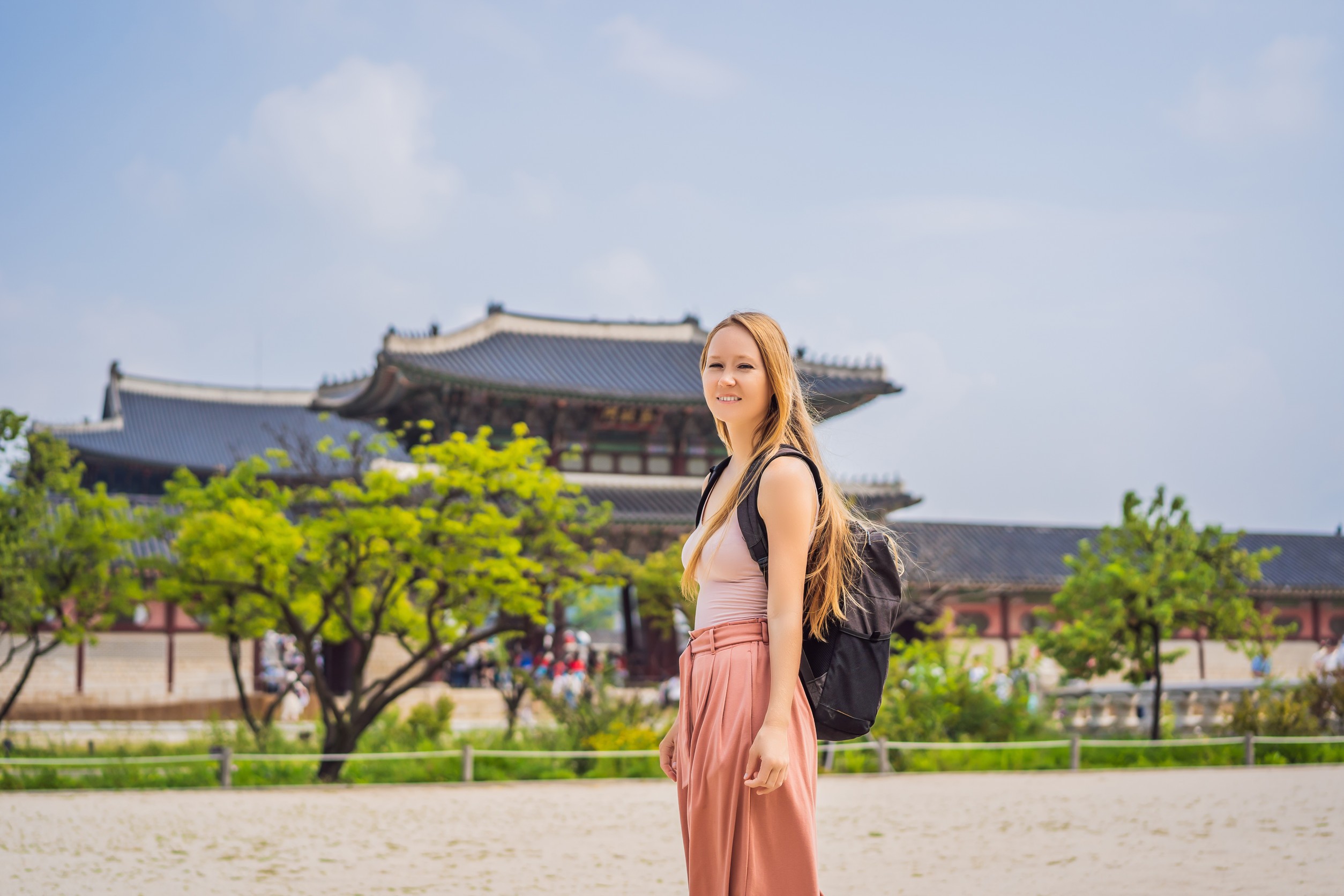Types of Diplomatic and Official Visas
Diplomatic and official visas come in various categories to accommodate the roles and purposes of travellers. These include:
|
Visa Type |
Description |
|
Diplomatic Visa (A-1) |
Issued to diplomats, consuls, and international organization representatives, typically for the duration of their mission. |
|
Official Visa (A-2) |
Granted to government officials, NGO members, and individuals on official assignments, usually for short-term stays. |
Eligibility for Diplomatic and Official Visas
To qualify for diplomatic or official South Korea visas, applicants must meet specific criteria based on their official role and purpose of travel. Common eligibility requirements include:
|
Visa Type |
Purpose |
Eligible Applicants |
Required Documentation |
|
Diplomatic Visa (A-1) |
For individuals representing their government or international organization in an official capacity |
Foreign diplomats (ambassadors, consuls, diplomatic staff), government officials, representatives of international organizations |
Documentation confirming official role and purpose of visit, provided by government or international organizations |
|
Official Visa (A-2) |
For individuals engaged in official government functions or international cooperation activities |
Government officials, NGO representatives, personnel involved in multilateral/bilateral activities, trade missions, or international projects |
Invitation or official letter from South Korean government agency, embassy, or international organization confirming the official nature of the visit |
Diplomatic Visa (A-1)
This visa is primarily for individuals representing their government or an international organization in an official capacity. Eligible applicants include:
- Foreign Diplomats: Ambassadors, consuls, and other diplomatic staff accredited to South Korea. This includes high-ranking representatives from foreign embassies or consulates.
- Government Officials: Senior government officials from foreign countries, including those engaged in state-level negotiations, bilateral agreements, or diplomatic visits.
- Representatives of International Organizations: Individuals representing global institutions such as the United Nations, World Bank, or other international bodies that are engaged in diplomatic activities in South Korea.
To qualify, applicants must provide documentation from their respective governments or international organizations, confirming their official role and purpose of visit.
Official Visa (A-2)
The Official visa is designed for individuals involved in official government functions or activities related to international cooperation. Eligible applicants include:
- Government Officials: Individuals working for their home government and traveling to South Korea for official duties, such as participating in diplomatic meetings, state functions, or governmental cooperation programs.
- NGO Representatives: Members of non-governmental organizations (NGOs) who are engaged in activities aligned with governmental or official purposes. This includes personnel working on official projects, humanitarian missions, or international development programs.
- Personnel Engaged in Multilateral or Bilateral Activities: This includes individuals working on international agreements, trade missions, joint research projects, or any other official cooperative efforts between their home country and South Korea.
To be eligible, applicants must submit an invitation or official letter from a South Korean government agency, embassy, or international organization confirming the official nature of their visit and the scope of their duties.
Application Process for Diplomatic and Official Visas
The application process for Diplomatic and Official visas in South Korea is specific and requires documentation to prove the applicant's official status and purpose. Below are the key steps involved:
Diplomatic Visa (A-1)
- Submit an Official Request: The applicant's home country’s embassy or diplomatic mission must submit an official request or note verbale to the Ministry of Foreign Affairs (MOFA), detailing the purpose of the visit and the individual’s diplomatic status.
- Supporting Documents: The embassy must provide necessary supporting documents, including:
-Diplomatic passport or an official passport
-Invitation letter from the South Korean government or international organization
-Proof of the official role (such as a letter from the home country’s foreign ministry)
- Application Submission: The home country’s embassy submits the documents to the South Korean Embassy or Consulate in the applicant’s home country.
- Visa Issuance: Once the application is processed and approved, the diplomatic visa is issued, which allows the applicant to enter South Korea and engage in their official duties.
Official Visa (A-2)
- Obtain Official Invitation: The applicant must receive an official invitation letter from a South Korean government department, embassy, or authorized organization. The letter should outline the purpose and nature of the official visit.
- Submit Application: Applicants must submit the following documents to the South Korean Embassy or Consulate:
-Valid official or government-issued passport
-Invitation letter from the South Korean agency or organization
-Proof of employment or position (such as a letter from the applicant’s home government or organization)
- Additional Documentation: Depending on the nature of the visit, additional documents such as a schedule of events, proof of financial support, or travel arrangements may be required.
- Interview or Additional Verification: In some cases, applicants may need to attend an interview or provide further verification of their role. The South Korean embassy will assess the application and ensure all documentation is in order.
- Visa Approval: Once approved, the official visa will be issued, allowing the individual to travel to South Korea and participate in the official functions or duties for which the visa was granted.
Validity of Diplomatic and Official Visas
The validity of Diplomatic and Official visas varies depending on the purpose and length of the assignment:
- Diplomatic Visa (A-1): Valid for the duration of the diplomat's assignment, which can range from several months to years. It is often issued as a multiple-entry visa and can be extended if the assignment is prolonged.
- Official Visa (A-2): Generally issued for shorter durations, typically from a few weeks to several months, depending on the official mission. It may also allow for multiple entries and can be extended if the official duties require a longer stay.
Processing Time and Fees
When applying for Diplomatic and Official visas for South Korea, it's important to understand the processing times and fees. Both visa types are generally issued for government or international duties and may come with benefits like fee exemptions, though processing times can vary depending on the specific mission and applicant’s status.
Processing Time
Both visas typically take several weeks to process, as they require coordination with South Korean authorities and, in some cases, additional approvals from the home government or organization.
Fees
Diplomatic and Official visas are generally fee-exempt, though some administrative processing fees may apply depending on the embassy or consulate handling the application.
Handling Diplomatic and Official Visa Issues

Applicants for Diplomatic and Official visas to South Korea may face several challenges. Here are common issues and ways to address them:
- Delays in Processing: Caused by incomplete documents or additional approvals. Ensure all required paperwork is submitted early and follow up regularly.
- Incorrect Documentation: Missing or incorrect documents can lead to delays or rejection. Double-check requirements and ensure all documents are accurate.
- Visa Refusal: Can occur due to insufficient proof of official status. Address the reasons for refusal by submitting additional documents or clarifying the purpose of the visit.
- Shortened Visa Duration: Sometimes, visas are issued for shorter periods than expected. Request an extension with proof of the extended assignment.
- Unclear Guidelines for Dependents: Confusion around visas for family members. Verify dependent visa requirements and ensure clarity with the embassy.
- Changes in Official Status: Changes to assignments can complicate visa validity. Notify the embassy promptly about any changes.
Difference Between Diplomatic, Official, and Regular Visas
Visas are required for foreign nationals wishing to enter South Korea, but the type of visa issued depends on the purpose of the visit. Here’s a breakdown of the main differences between Diplomatic, Official, and Regular visas:
|
Aspect |
Diplomatic Visa (A-1) |
Official Visa (A-2) |
Regular Visa |
|
Purpose |
Issued to diplomats and foreign government officials, such as ambassadors, consuls, and representatives of international organizations. |
Issued to government officials, members of NGOs, or individuals involved in official duties related to government or international cooperation. |
Issued to individuals traveling for purposes unrelated to government or official business, such as tourism, business, or study. |
|
Eligibility |
Typically granted to individuals holding diplomatic or official positions representing their home country or an international organization. |
Available to those who are traveling for work that involves government functions, such as bilateral or multilateral meetings, official exchanges, or humanitarian missions. |
Available to those who are traveling for work that involves government functions, such as bilateral or multilateral meetings, official exchanges, or humanitarian missions. |
|
Privileges |
Diplomats enjoy certain immunities and privileges, such as exemption from taxes and customs duties, and their family members may also be eligible for similar benefits. |
Generally provides some facilitation in terms of entry, but not the same level of immunity or privileges as a diplomatic visa. |
Regular visa holders do not enjoy the same exemptions or privileges as diplomats or officials. They are subject to standard immigration controls. |
|
Duration |
Usually granted for the duration of the diplomatic mission, which can vary from several months to years. |
Typically short-term, ranging from weeks to a few months, depending on the nature of the official mission. |
Valid for short stays, typically ranging from a few days to a year, depending on the type of visa (tourist, business, etc.). |
|
Processing |
Requires an official request from the applicant's home country’s foreign ministry or embassy. |
Generally provides some facilitation in terms of entry, but not the same level of immunity or privileges as a diplomatic visa. |
Applicants must submit various documents, such as a passport, invitation letter (if applicable), and evidence of the purpose of travel. |
Common Mistakes to Avoid When Applying
When applying for Diplomatic and Official visas to South Korea, it’s important to be mindful of common pitfalls that can delay or jeopardize your application. Below are some mistakes to avoid to ensure a smoother and more successful visa process.
Incomplete or Incorrect Documentation: Double-check all required documents, such as invitation letters and proof of official status, to avoid delays or rejection.
Not Following the Correct Application Process: Follow the proper channels, such as coordination with your home country's embassy or ministry, rather than applying directly.
Incorrect Visa Category: Ensure you apply for the right visa (Diplomatic or Official) based on your visit's purpose.
Submitting Outdated Documents: Ensure all documents, including passports and invitation letters, are current and valid.
Failure to Provide Proof of Official Status: Submit the required documentation to prove your diplomatic or official role.
Ignoring Processing Times: Apply well in advance to account for the lengthy processing times of Diplomatic and Official visas.
Not Considering Family Members: Don’t forget to submit visa applications for accompanying family members with all necessary documents.
Not Double-Checking Invitation Letters: Ensure invitation letters clearly state the purpose, dates, and details of the visit.
Benefits of Applying for Diplomatic and Official Visas

Applying for Diplomatic and Official visas in South Korea offers several key benefits, including:
- Exemption from Standard Immigration Procedures: Visa holders are often exempt from routine immigration control requirements, allowing for expedited entry.
- Longer Duration of Stay: These visas are typically issued for extended stays, often aligning with the length of the diplomatic or official assignment.
- Facilitated Travel for Dependents: Diplomats and government officials may have the option to bring dependents without facing significant visa hurdles.
- Special Treatment for Official Duties: Visa holders receive priority for activities related to official government or international work, ensuring smooth participation in bilateral and multilateral discussions or projects.
- Easier Access to Multiple Entries: Diplomatic and Official visa holders may be granted multiple-entry options, allowing for flexible travel in and out of South Korea during their assignment.
Frequently Asked Questions
Diplomatic visas are granted to diplomats, ambassadors, and representatives of international organizations. Official visas are issued to government officials, NGO workers, and individuals traveling for official business.
Diplomatic visas are typically valid for the duration of the diplomat's assignment, ranging from months to years. Official visas are usually issued for short-term stays, from weeks to a few months.
Yes, both Diplomatic and Official visa applicants typically require an invitation letter from the South Korean government, embassy, or an international organization that will host the official visit.
Diplomatic and Official visas are generally fee-exempt, though administrative processing fees may apply depending on the embassy or consulate handling the application.
Processing times usually range from a few weeks to a month. It may take longer if additional documentation or approvals are required.
Yes, both visa types can be extended, depending on the purpose and duration of your official duties in South Korea. Extension requests should be submitted well in advance.
Yes, family members (spouse, children) of diplomats and officials can apply for dependent visas to accompany the visa holder during their stay in South Korea.
If your visa is denied, you will be informed of the reason, and you may appeal or provide additional documentation to clarify the purpose of your visit.
Content Disclaimer: Although this information was last updated in January 2025, we recommend verifying with the appropriate agencies, embassies, and airlines to ensure complete accuracy regarding your travel plans.


To help us improve